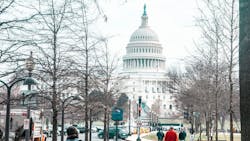House T&I Committee intros $547 billion INVEST in America Act
Leadership in the House Committee on Transportation and Infrastructure introduced a five-year $547-billion surface transportation reauthorization bill. The bill has been labeled “transformational” and, according to the committee’s press release on the proposed legislation, “offers a new approach to federal transportation policy.”
“The benefits of transformative investments in our infrastructure are far-ranging: we can create and sustain good-paying jobs, many of which don’t require a college degree, restore our global competitiveness, tackle climate change head-on, and improve the lives of all Americans through modern infrastructure that emphasizes mobility and access, and spurs our country’s long-term economic growth,” Committee Chair Peter DeFazio (D-OR-04) said. “The INVEST in America Act puts a core piece of President [Joe] Biden’s American Jobs Plan into legislative text—seizing this once-in-a-generation opportunity to move our transportation planning out of the 1950s and toward our clean energy future. Let’s get this done.”
What’s in the bill
The legislation includes $343 billion for roads, bridges and safety; $109 billion for transit; and $95 billion for passenger and freight rail.
Highlights from the transit funding includes:
• $73.5 billion in formula funding and a directive that transit data from FY20 and FY21 that has been impacted by COVID-19 will not be used to calculate transit formula apportionments.
• $18.25 billion over five years for the Capital Investment Grants Program; along with policy changes that would add affordable housing incentives to the program, reduces the “bureaucratic burden” within the approval process and repeals the Expedited Project Delivery pilot program (but grandfathers in projects currently participating).
• $100 million annually for new grant program to increase bus frequency.
• More than $4 billion for zero-emission bus grants.
• $1 billion to bring transit stations into ADA compliance.
• $1 billion in new or increased service in unserved or underserved areas.
The bill would also revise the incentive formula from low operating costs to a formula based on vehicles per hour during peak service; it creates new rules for on demand mobility services and mobility-as-a-service; and temporarily waives the rolling stock spare ratio for two years as agencies recover from the effects of COVID-19.
Highlights for passenger rail from the bill includes:
• The proposal triples Amtrak’s investment and includes $32 billion over five years for the railroad’s Northeast Corridor.
• $2.5 billion for grade-crossing separation grants.
• $25 billion over five years for passenger rail improvement grants, grants for bridges, stations and tunnels.
• $7 billion Consolidated Rail Infrastructure and Safety Improvements (CRISI) grants.
• $25 billion to establish new Passenger Rail Improvement, Modernization and Expansion (PRIME) grants that aims to modernize and develop passenger rail service and expand existing rail corridors.
Additional highlights from the proposal include:
• $250 million annually to establish grant program to reduce greenhouse gas emissions (eligibility includes intercity bus vehicles and facilities and intercity passenger rail projects that reduce greenhouse gas emissions and improve mobility on public roads).
• $1 billion active transportation grants.
• $14.7 billion for member designated projects.
The full text, as well as section highlights and a fact sheet from the bill are available on the House Transportation and Infrastructure Committee’s website.
Reactions overwhelmingly positive
The American Public Transportation Association (APTA) issued a statement supporting the bill with APTA President and CEO Paul Skoutelas saying the proposal would put U.S. infrastructure “on footing to compete with any country in the world.”
“This once-in-a-generation, forward-thinking investment will help our communities meet growing mobility demands, create family-wage jobs, expand U.S. manufacturing and supply chains and grow the economy. This legislation will put us on the path to increase access to opportunities for all Americans and build more equitable communities, while also addressing the environmental and sustainability challenges facing our communities, nation and the world. In addition to these critical investments, the INVEST in America Act includes important policies from streamlining the Capital Investment Grant program to investing in new technologies like zero-emission buses that will create the transportation systems of the future,” said Skoutelas.
He added, “The time is now to make this transformational investment in our national infrastructure that will provide staying power to drive our economy for years to come.”
In a statement regarding the legislation, Amtrak said its initial review of the bill “is a bold commitment to a stronger Amtrak and more sustainable transportation system that America needs.”
“The bill authorizes the robust funding necessary to allow Amtrak to better serve the country. It provides additional funding to help advance the recently released Amtrak Connects US vision to bring more trains to new customers and underserved communities, and address Amtrak’s aging bridges, tunnels and fleet. In addition, the bill would help Amtrak enforce its statutory right to preference so that passengers arrive on time and ensure fair and expeditious access to rail lines to expand service,” the railroad said. “If enacted, these provisions will strengthen Amtrak to deliver the 21st century intercity passenger rail network that America needs.”
The U.S. Senate has advanced its own version of surface transportation legislation out of committee and Chairman of the Senate Committee on Environment and Public Works Tom Carper (D-DE) says he was “pleased” to see the House put forth the legislation.
“Both of our bills share the common principle of modernizing our transportation infrastructure in a way that creates good-paying jobs, addresses the climate crisis and prioritizes safety and connectivity. Now, it’s time for the other committees of jurisdiction in the Senate to follow our lead,” said Sen. Carper.
The House Transportation and Infrastructure Committee is scheduled to markup the bill on Wednesday, June 9. The committee will share text that includes member designated projects prior to markup.

Mischa Wanek-Libman | Group Editorial Director
Mischa Wanek-Libman is director of communications with Transdev North America. She has more than 20 years of experience working in the transportation industry covering construction projects, engineering challenges, transit and rail operations and best practices.
Wanek-Libman has held top editorial positions at freight rail and public transportation business-to-business publications including as editor-in-chief and editorial director of Mass Transit from 2018-2024. She has been recognized for editorial excellence through her individual work, as well as for collaborative content.
She is an active member of the American Public Transportation Association's Marketing and Communications Committee and served 14 years as a Board Observer on the National Railroad Construction and Maintenance Association (NRC) Board of Directors.
She is a graduate of Drake University in Des Moines, Iowa, where she earned a Bachelor of Arts degree in Journalism and Mass Communication.




